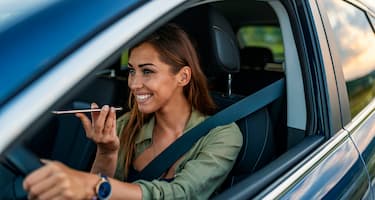Find out about Australians' experiences and attitudes towards road rage from Budget Direct's latest survey.
Quick Stats
83% of Australians surveyed have been shouted at, sworn at or on the receiving end of rude hand gestures made by other road users. This result has increased by 18% since 2021. [1]
80% of Australians surveyed felt angry or annoyed when other road users drove dangerously. This could include excessive speeding, becoming distracted and/or falling asleep at the wheel.
50% of Australians surveyed think that Holden drivers are the most aggressive on the road.
What is road rage?
Road rage has been linked to displaced anger, aggressiveness and high levels of stress.
And committing road rage can be defined as “aggressive or violent behaviour by a motorist towards another road user, usually the driver of another vehicle?
This can include:
Swearing
Shouting
Rudely gesturing
Threatening another driver
Harming another driver
Damaging someone else’s vehicle
Motorists often experience road rage when:
Trying to merge
Other drivers are not indicating
Drivers make direct eye contact with other motorists
Other drivers don’t keep a safe distance behind another vehicle
While there are no specific laws related to road rage in Australia, threatening or verbally abusing at least one other driver could be considered an assault.
Tailgating (also known as anti-social driving) is also considered an illegal activity across all states and territories. Failing to follow the car in front of you at a safe distance can lead to fines and additional demerit points recorded on your driving record.
Road Rage Survey Results^
How often do you drive a car or motor vehicle?
^Due to how the figures are rounded within the survey data, numbers may not add up to exactly 100%
Nearly 70% (67.27%) of Australians surveyed drive their car or motor vehicle daily.
More than 80% of participants aged 35-44 drive every day and 14% of respondents aged 55-64 never drive.
Almost 70% of Queenslanders surveyed drive daily. Nearly 30% (27.66%) of Western Australians drive only once or twice a week. And 10% of South Australian participants never drive.
Since 2021, the number of Australian respondents who drive daily has increased by more than 10%. [1]
Have you ever been involved in a road rage incident?*
*For example, you or another driver make gestures at each other, yell, swear, threaten or cause harm.
^Due to how the figures are rounded within the survey data, numbers may not add up to exactly 100%
Nearly 48% of the Australians surveyed have been involved in a road rage incident.
Over 50% of respondents aged 25-34 have been involved in a road rage incident.
Nearly 55% of Victorians surveyed were involved in a road rage incident compared to only 40% of Western Australians.
During the past 12 months, when driving, which types of road rage have you experienced from another road user?*
*Respondents were able to select multiple answers, meaning values may not add up to 100%
^Due to how the figures are rounded within the survey data, numbers may not add up to exactly 100%
Of the Australians surveyed, 83% said they’ve been shouted at, cursed at or on the receiving end of rude gestures made by other road users.
Of the female respondents, 87% reported they’ve been shouted at, cursed at or on the receiving end of rude gestures made by other road users.
Of Victorians surveyed, 17% reportedly had another road user intentionally damage or attempt to damage their vehicle.
Since 2020, the number of road users surveyed who have been shouted at, cursed at or on the receiving end of rude gestures made at them has increased by around 10%. [1]
During the past 12 months, when driving, which types of road rage have you directed toward another road user?*
*Respondents were able to select multiple answers, meaning values may not add up to 100%
^Due to how the figures are rounded within the survey data, numbers may not add up to exactly 100%
Of the Australians surveyed, 47% said they’ve not directed any road rage towards another road user.
Of the male respondents, 48% admitted they’ve shouted, cursed or made rude gestures towards other people on the road.
Of 25-34 year-old respondents, 12% reported they’ve intentionally hurt or threatened another road user.
Of South Australians surveyed, 60% said they did not direct any road rage towards another person.
Since 2021, incidents of road rage (as reported by those surveyed) have increased slightly. While road rage is not a crime, other offences that occur due to road rage incidents can be crimes. [1]
Which of the following situations would cause you to feel angry or annoyed while driving?*
*Respondents were able to select multiple answers, meaning values may not add up to 100%
^Due to how the figures are rounded within the survey data, numbers may not add up to exactly 100%
Nearly 80% of Australians surveyed felt angry or annoyed when other road users drove dangerously. This could include cutting in front of your car, forcing you to brake and not indicating.
Of those surveyed, 60% felt annoyed because of rudeness from other road users.
Nearly 60% of female respondents felt angry or annoyed when other road users showed aggression towards them.
And 85% of Queenslanders surveyed get angry at other road users' dangerous driving behaviours.
In 2020, drivers who were surveyed felt significantly more angry and annoyed towards other road users in all situations. From 2021-2023, of those surveyed, drivers' feelings towards other road users have remained the same. [1]
Do your road rage behaviours change when you have a passenger in the car with you?
^Due to how the figures are rounded within the survey data, numbers may not add up to exactly 100%
Only 37% of Australians surveyed said they’re less likely to act aggressively with a passenger in the car.
Of all the respondents, 9% of those aged 18-24 reported they’re more likely to act aggressively with a passenger.
In Queensland, 65% of those surveyed said they act the same regardless of whether or not they have a passenger in the car.
In 2023, the number of Australians surveyed less likely to act aggressively with a passenger in the car has increased by nearly 10% since 2021. [1]
Does the music you listen to affect your likelihood of acting aggressively toward other road users?
^Due to how the figures are rounded within the survey data, numbers may not add up to exactly 100%
Of Australians surveyed, 80% think the music you listen to does not affect how you act towards other road users.
However, over 20% of male participants think music affects their aggression towards other road users.
Of respondents, 25% of those aged 18-24 also think the type of music they listen to will determine their actions towards other road users.
And a quarter of respondents from New South Wales think that the music they listen to does impact the likelihood of them acting aggressively.
In 2023, the number of Australians surveyed who think music impacts the way they drive has increased by 6% since 2021. [1]
Do you feel like certain makes/models of car make a driver more likely to be aggressive on the roads?
^Due to how the figures are rounded within the survey data, numbers may not add up to exactly 100%
Of Australians surveyed, 55.15% do not believe a car make or model can determine how aggressive a driver will be on the road.
More than half of respondents aged 18-24 thought that the car makes or models they drive will impact their level of aggressive driving. While over 60% of respondents aged 35-44 said that the model or make of a car does not make a driver more likely to be aggressive on the roads.
Nearly 60% (57.45%) of Western Australians surveyed believe that your car's make or model will impact your level of aggression.
From 2021-23 the number of Australian participants who believe a specific car make or model can determine a driver's aggression has increased by nearly 5%. [1]
Which of the following makes/models of cars do you feel have more aggressive drivers? *
| Female | Male | |
|---|---|---|
| Audi | 22.64% | 27.27% |
| BMW | 37.74% | 45.08% |
| Ford | 39.00% | 34.00% |
| Holden | 47.00% | 49.00% |
| Hyundai | 5.00% | 3.00% |
| Kia | 2.00% | 4.00% |
| Mazda | 4.00% | 5.00% |
| Mitsubishi | 12.00% | 8.00% |
| Mercedes Benz | 27.00% | 31.00% |
| Nissan | 24.00% | 12.00% |
| Toyota | 22.00% | 19.00% |
| Volkswagen | 4.00% | 11.00% |
| 18-24 years | 25-34 years | 35-44 years | 45-54 years | 55-64 years | |
|---|---|---|---|---|---|
| Audi | 33.33% | 26.79% | 13.79% | 24.74% | 23.08% |
| BMW | 58.33% | 40.18% | 37.93% | 38.14% | 38.46% |
| Ford | 24.00% | 34.00% | 41.00% | 41.00% | 38.00% |
| Holden | 38.00% | 52.00% | 48.00% | 55.00% | 54.00% |
| Hyundai | 4.00% | 6.00% | 3.00% | 1.00% | 8.00% |
| Kia | 4.00% | 6.00% | 3.00% | 0.00% | 4.00% |
| Mazda | 6.00% | 5.00% | 0.00% | 3.00% | 8.00% |
| Mitsubishi | 11.00% | 10.00% | 0.00% | 5.00% | 23.00% |
| Mercedes Benz | 39.00% | 30.00% | 28.00% | 25.00% | 27.00% |
| Nissan | 5.00% | 16.00% | 31.00% | 12.00% | 35.00% |
| Toyota | 18.00% | 15.00% | 14.00% | 20.00% | 31.00% |
| Volkswagen | 11.00% | 4.00% | 3.00% | 11.00% | 15.00% |
| New South Wales | Victoria | Queensland | Western Australia | South Australia | |
|---|---|---|---|---|---|
| Audi | 33.67% | 20.27% | 18.87% | 25.93% | 35.71% |
| BMW | 52.04% | 43.24% | 35.85% | 51.85% | 40.48% |
| Ford | 31.00% | 34.00% | 36.00% | 33.00% | 40.00% |
| Holden | 41.00% | 55.00% | 48.00% | 59.00% | 50.00% |
| Hyundai | 3.00% | 1.00% | 6.00% | 4.00% | 2.00% |
| Kia | 2.00% | 7.00% | 2.00% | 4.00% | 0.00% |
| Mazda | 4.00% | 4.00% | 7.00% | 4.00% | 0.00% |
| Mitsubishi | 8.00% | 8.00% | 11.00% | 0.00% | 12.00% |
| Mercedes Benz | 37.00% | 26.00% | 22.00% | 33.00% | 38.00% |
| Nissan | 6.00% | 11.00% | 27.00% | 11.00% | 17.00% |
| Toyota | 11.00% | 15.00% | 26.00% | 15.00% | 31.00% |
| Volkswagen | 11.00% | 4.00% | 6.00% | 15.00% | 17.00% |
*Respondents were able to select multiple answers, meaning values may not add up to 100%
^Due to how the figures are rounded within the survey data, numbers may not add up to exactly 100%
Nearly half of the Australians surveyed think Holden drivers are more aggressive. And just over 40% of Australians believe that BMW drivers are also aggressive behind the wheel. Next are Ford drivers (35%) and drivers with a Mercedes Benz (30%).
Of the male respondents, 45% thought that drivers with a BMW were more aggressive.
Out of all the respondents, almost 60% of those aged 18-24 agreed that drivers with a BMW were more aggressive on the road. Only 14% (13.79%) of respondents aged 35-44 thought that Audi drivers were more aggressive.
Of Western Australians surveyed, almost 60% think drivers with a Holden are the most aggressive on the road. Over 50% of respondents from New South Wales believe that BMW drivers were more aggressive.
Which of these signs in cars would make you less likely to be aggressive to the driver? *
*Respondents were able to select multiple answers, meaning values may not add up to 100%
^Due to how the figures are rounded within the survey data, numbers may not add up to exactly 100%
Of Australians surveyed, 43% said they would treat every motorist the same way. However, 41% of Australian respondents are less likely to be aggressive towards a driver with L-Plates.
Only 16% of female respondents would be less aggressive towards P-Plate drivers.
Of the 18-24 year olds surveyed, 45% said they’d be less aggressive towards L-Plate drivers. Nearly 25% of this same age group would be less likely to act aggressively towards drivers on their P-Plates.
Of South Australians surveyed, 54% said they would treat every motorist the same.
In 2021, more than 50% of Australians surveyed said they would treat every motorist the same way compared to only 43% in 2023. In 2023, Australian respondents report they’re more considerate about how they act towards drivers with these signs on their cars. [1]
Do you use any mindfulness, breathing, or calming strategies if you find yourself aggravated by other road users?
^Due to how the figures are rounded within the survey data, numbers may not add up to exactly 100%
Only 40% of Australians surveyed use mindfulness, breathing or calming techniques when they become frustrated with other drivers.
Only 25% of respondents aged 55-64 used mindfulness to calm themselves down while driving.
Of the Victorians surveyed, 45% use mindfulness techniques when they become frustrated by other drivers.
By 2023, the number of Australian respondents who used mindfulness, breathing or calming strategies while driving had increased by nearly 10%. [1]
Would you intervene if you witnessed a road rage incident?
^Due to how the figures are rounded within the survey data, numbers may not add up to exactly 100%
Of Australian participants, 47% said they’d call the police if they witnessed a road rage incident.
Of the male respondents, 25% reported they’d intervene in a road rage incident.
Over 27% of respondents aged 18-24 said they’d intervene, while 70% of 55-64-year-olds would call the police instead.
Almost 60% of South Australians surveyed reported they’d call the police if they witnessed a road rage incident.
Do you think the police should do more to respond urgently to complaints of road rage?
^Due to how the figures are rounded within the survey data, numbers may not add up to exactly 100%
Nearly 80% of Australians surveyed think police should respond more urgently to road rage complaints.
Of the female respondents, 85% think police should do more when responding to road rage complaints.
Over 90% of respondents aged 55-64 think police should respond more urgently to road rage incidents.
Of the South Australians surveyed, 86% believe police should do more when responding to road rage.
From 2021-23, the number of Australians surveyed who thought police should respond more urgently to road rage complaints stayed mostly the same. [1]
Key Takeaways
Dangerous Driving Behaviours
A majority of Australians surveyed felt angry or annoyed when other road users drove dangerously. This could include speeding, distracted driving, fatigued driving and drink driving.
Dangerous driving behaviours can lead to car accidents and other road fatalities. And as of March 2023, there have been 1,204 road safety deaths in the last 12 months. [3]
Car Makes and Models
Half of the Australians surveyed think Holden owners are the most aggressive drivers. This is followed by BMW, Ford and drivers who own a Mercedes Benz.
At one point, the Holden Commodore was the most popular vehicle sold in Australia. Holden’s cars are known for being “made for Australians by Australians”.
As of 2022, 8% of Australians owned a Holden, 7% owned a BMW, 8% owned a Ford and only 1% owned a Mercedes Benz. [4]
L-Plate and P-Plate drivers
Over 40% of Australians surveyed are less likely to be aggressive towards learner drivers. And of these Australians, 45% of them are between the ages of 18-24.
According to Queensland Government’s Street Smarts, a learner’s risk of a serious crash is six times higher than other drivers when they first get their P-plates. This is why learner drivers are at their safest when accompanied by a supervising driver. [5]







